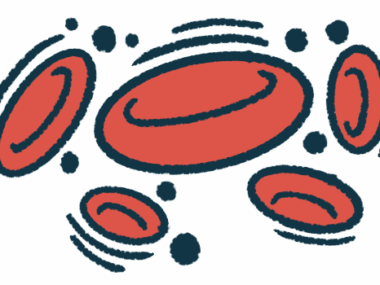How I practice patience and anticipation with CAD
I've gotten accustomed to waiting as part of living with this condition
Written by |

I slumped into the wheelchair waiting for me outside the airplane door. It had been a long 36-hour trip. I was able to catnap in my economy seats, but my exhausted body was looking forward to getting home and becoming fully horizontal. Then my phone buzzed. The notice said my carry-on suitcase, which I’d checked at the last airport, was waiting for me at baggage carousel 1.
That was nice. It’d be nicer still if my checked suitcase, which hadn’t caught the flight out of Singapore, had somehow caught up with me and was awaiting me, too. I anticipated a happy reunion.
This past week I made my regular trek from Papua, Indonesia, where my husband and I work, to my home in Auburn, Alabama. It’s a journey that takes between 35 and 50 hours of travel. I make the trip so my cold agglutinin disease (CAD) can be monitored. I spent many years patiently searching for a diagnosis, so I’m loath to change physicians now.
The reason for travel
Cold agglutinin disease is in the spectrum of autoimmune hemolytic anemias. We CADdies, as those of us with CAD call ourselves, monitor the ambient temperature constantly. When the temperature dips below certain degrees, our red blood cells clump together, agglutinate, and are destroyed. This process results in anemia, and we become fatigued.
The destruction of our red blood cells means less oxygen is carried throughout our bodies. We often experience brain fog, nonspecific aches and pains, frequent infections, and even heart difficulties. My annual trek to the hematologist-oncologist is to determine if the symptoms are building and treatment is warranted.
I’ve anticipated this trip since January. Although my last appointment was in October, I’d been tired and feeling rundown while experiencing long healing from minor infections. It also takes a bit of planning to travel around the world. I’ve learned to be patient when putting those plans together.
Waiting expectantly through challenges
Patient anticipation seems to characterize my life since the diagnosis of CAD. In recent years, as my fatigue builds, I spend more and more of my life within my home. Back in March, I was cheerfully editing pictures and taking care of projects. Then a horrible thing happened: My laptop quit. The screen was black. It hasn’t functioned since.
It was a disaster! I use my laptop for entertainment, work, and communicating. It keeps me connected to the world outside the confines of my house. Without my computer, life would get significantly more difficult for me.
My loss is temporary, and I’ve developed other, less-efficient ways to get things done. Also, a partner with our ministry volunteered to supply me a new laptop, though getting it to me was problematic. I was grateful to him and began anticipating a return to normal.
Alas, it’s taken much longer than I thought it would to get that laptop. Another friend promised to bring it to me on a trip from the U.S. to Sentani, Papua, Indonesia, where I live. The laptop was sent to my friend, but in the flurry of last-minute packing and wake of his wife’s back surgery, he forgot it. That’s when I exercised patience.
CADdies are special people
CADdies express both patience and anticipation in abundance. We’re patient with our limited energy, waiting through long winters for the weather to change so we can begin going outdoors again. We wait to get lab results, and we wait again to hear explanations of those results. We anticipate a time when a treatment becomes available for this endless round of bloodwork and infusions. We anticipate the end of staying indoors.
I waited as I watched suitcase after suitcase come down the chute at the baggage carousel. Several appeared to be mine, but closer checking brought disappointment. The airline attendant wheeled me over to the office of lost luggage. I explained what had happened in Singapore. My suitcase was quickly located — still in Singapore.
As I write this column, I’ve been in the United States for eight days. I’m patiently waiting for my not-lost suitcase to arrive the next day, and I’m anticipating my new laptop arriving on the weekend. Thanks to cold agglutinin disease, I have both those qualities, patience and anticipation, in abundance.
Note: Cold Agglutinin Disease News is strictly a news and information website about the disease. It does not provide medical advice, diagnosis, or treatment. This content is not intended to be a substitute for professional medical advice, diagnosis, or treatment. Always seek the advice of your physician or other qualified health provider with any questions you may have regarding a medical condition. Never disregard professional medical advice or delay in seeking it because of something you have read on this website. The opinions expressed in this column are not those of Cold Agglutinin Disease News or its parent company, Bionews, and are intended to spark discussion about issues pertaining to cold agglutinin disease.







Susana Sabal
God Bless you! You will be much better soon.
Mary Lott
Yes, It seems like forever when I'm recovering, but when I'm better I tend to forget. Thank you for your encouragement.
Hazel Schmidt
I don’t feel alone with CAD when I read your stories
Mary Lott
And I don't feel alone when you and others write comments. We are rare in the world, but we are not alone. Thank you for writing.
Teresa Warren
Just reading these articles for first time made me emotional. Thank you for sharing because most people have no way of understanding what we go through.
Mary Lott
One of my favorite lines in the animated movie "Rudolph, the Red-Nosed Reindeer," narrated by Burl Ives is when the puppet tells Rudolph (or perhaps I have that backwards) is, "We can be independent, TOGETHER!" That is how I feel about CAD and CADdies. Many, including our nearest and dearest, don't understand our experience. I am glad that my articles are helping you escape the metaphorical "island of misfit" CADdies. Together, it isn't quite so lonely.